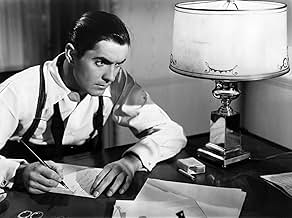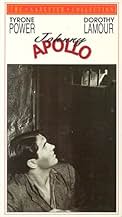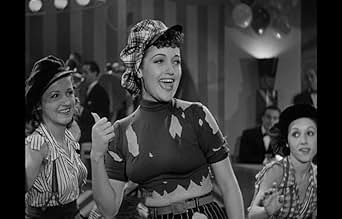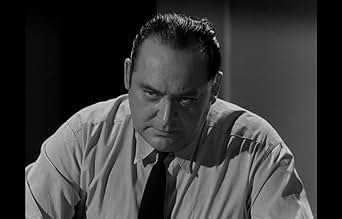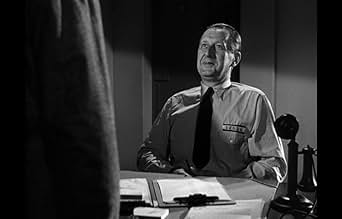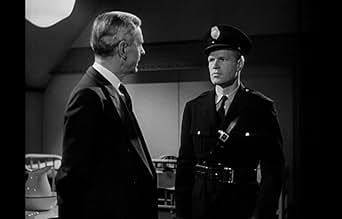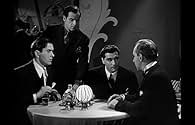AVALIAÇÃO DA IMDb
6,9/10
1,6 mil
SUA AVALIAÇÃO
Adicionar um enredo no seu idiomaThe son of a jailed Wall Street broker turns to crime to pay for his father's release.The son of a jailed Wall Street broker turns to crime to pay for his father's release.The son of a jailed Wall Street broker turns to crime to pay for his father's release.
- Direção
- Roteiristas
- Artistas
- Prêmios
- 2 vitórias no total
Selmer Jackson
- Warden
- (as Selmar Jackson)
Gary Breckner
- Announcer
- (narração)
Avaliações em destaque
Wall Street millionaire Edward Arnold (as Robert Cain Sr.) is indicted for embezzlement and goes directly to jail. Canoeing in his swim trunks, college student son Tyrone Power (as Robert "Bob" Cain Jr.) is shocked and disappointed. He disowns his dad and drops out of school. Now a convict's son, Mr. Power finds himself unable to find honest work. While waiting to see alcoholic lawyer Charley Grapewin (as Emmett T. Brennan), Power meets attractive Dorothy Lamour (as "Lucky" Dubarry) and paroled gangster Lloyd Nolan (as Mickey "The Mick" Dwyer). Power assumes the name "Johnny Apollo" and drifts into a life of crime...
This story is too loosely plotted, but not in a way that makes it difficult to follow...
Helping immensely is that the film is great looking, and directed exceptionally by Henry Hathaway. The black-and-white cinematography is especially noteworthy; photographer Arthur Miller might have received his annual "Academy Award" nomination for this one, if the studio wasn't backing him in "The Blue Bird" (1940). Then Fox' biggest star, Power shows he might have accomplished the same feat at MGM or Warner Bros. Singing and "Dancing for Nickels and Dimes", Ms. Lamour is luscious, especially in a leggy skirt and clinging top. Dependable supporting actors like Mr. Nolan and Mr. Grapewin get juicy parts, too.
******* Johnny Apollo (3/15/40) Henry Hathaway ~ Tyrone Power, Dorothy Lamour, Lloyd Nolan, Edward Arnold
This story is too loosely plotted, but not in a way that makes it difficult to follow...
Helping immensely is that the film is great looking, and directed exceptionally by Henry Hathaway. The black-and-white cinematography is especially noteworthy; photographer Arthur Miller might have received his annual "Academy Award" nomination for this one, if the studio wasn't backing him in "The Blue Bird" (1940). Then Fox' biggest star, Power shows he might have accomplished the same feat at MGM or Warner Bros. Singing and "Dancing for Nickels and Dimes", Ms. Lamour is luscious, especially in a leggy skirt and clinging top. Dependable supporting actors like Mr. Nolan and Mr. Grapewin get juicy parts, too.
******* Johnny Apollo (3/15/40) Henry Hathaway ~ Tyrone Power, Dorothy Lamour, Lloyd Nolan, Edward Arnold
While not a classic for the ages, this pre-noir gangster adventure is an excellent example of the studio product churned out in a short time to top a two-film bill at your local theatre in the 1940's, and one of the things that makes it great fun for committed film fans is the use of familiar faces to back up Tyrone Power, playing a rich kid turned bad boy, and Dorothy Lamour, who surprises us by offering a good deal more in the acting department than in the Crosby-Hope Road films, where she functioned primarily as tropical window dressing.
One fascinating performance is offered by the underused Charlie Grapewin, perhaps known to the average film goer as Uncle Henry in The Wizard of Oz, or as Grandpa in Grapes of Wrath (Grapewins's most sympathetic and memorable role is as burned-out Jeeter Lester in Jonh Ford's misunderstood Tobacco Road). In Johhny Apollo, Grapewin's take on the burned-out lawyer who takes milk with his Scotch and mumbles Shakespeare when to evade confrontation is both funny and endearing and he becomes a pivotal plot element as the plot thickens.
And thicken it does, with lusty Edward Arnold tossed into jail for embezzlement, and his disowned son, Power, taking up with gangster Lloyd Nolan (always reliable, but here essayed with a nasty undercurrent); much of what Nolan's brutal ganglord does adds a noir element to the film,and a brief scene in a steam bath is right out of Sam Fuller.
Add thug Marc Lawrence from Broadway, Jonathan Hale, reliably a doctor, Fuzzy Knight as a nervous prisoner, and from the Son of Frankenstein, Lionel Atwill, cold and calculating as the lawyer without ethics--until money is dangled his way. The pace never flags, and, except for a short and absurd tagged-on ending that Zanuck probably demanded on behalf of Power fans, the film builds to a dynamic shoot-out in a prison. Not a great classic, but a perfect example of 20th Century Fox machine making a film worth watching.
One fascinating performance is offered by the underused Charlie Grapewin, perhaps known to the average film goer as Uncle Henry in The Wizard of Oz, or as Grandpa in Grapes of Wrath (Grapewins's most sympathetic and memorable role is as burned-out Jeeter Lester in Jonh Ford's misunderstood Tobacco Road). In Johhny Apollo, Grapewin's take on the burned-out lawyer who takes milk with his Scotch and mumbles Shakespeare when to evade confrontation is both funny and endearing and he becomes a pivotal plot element as the plot thickens.
And thicken it does, with lusty Edward Arnold tossed into jail for embezzlement, and his disowned son, Power, taking up with gangster Lloyd Nolan (always reliable, but here essayed with a nasty undercurrent); much of what Nolan's brutal ganglord does adds a noir element to the film,and a brief scene in a steam bath is right out of Sam Fuller.
Add thug Marc Lawrence from Broadway, Jonathan Hale, reliably a doctor, Fuzzy Knight as a nervous prisoner, and from the Son of Frankenstein, Lionel Atwill, cold and calculating as the lawyer without ethics--until money is dangled his way. The pace never flags, and, except for a short and absurd tagged-on ending that Zanuck probably demanded on behalf of Power fans, the film builds to a dynamic shoot-out in a prison. Not a great classic, but a perfect example of 20th Century Fox machine making a film worth watching.
Tyrone Power plays privileged young man Bob Cain, Jr., who adopts the nom de guerre Johnny Apollo when he takes to a life of crime. (Incidentally, this movie thus kicks off a string of at least a dozen crime stories of the 40s and 50s named Johnny Something-Or-Other: Eager, O'Clock, Stool Pigeon....) Power chooses crime to spite his father (Edward Arnold) by emulating his dog-eat-dog ethics, for financial tycoon Arnold has been sent to prison for embezzlement, causing a rift between the generations.
After Power's initial snit over Dad's letting him down, his attempts to secure him an early parole lead, though `connected' shantoozie Dorothy Lamour, to the underworld. The muscles he developed rowing crew in the Ivy League stand him in good stead as muscle in the mob, for soon he becomes a trusted lieutenant in Lloyd Nolan's crime family (plausibility is not the movie's long suit). But Pop (who has reclaimed his spiritual center in the Big House by welding boilers) disowns his namesake when he learns of his new line of work. In due time, of course, Power ends up behind those bars as well. But that's far from the end of the tale....
The plot of Johnny Apollo, a major production, takes a few turns too many but manages to keep a just-passable amount of credibility. Though Power, in the lead, stays less than persuasive as a menacing mobster he's too much of a pretty-boy, and lacks the acting resources to turn himself into a pretty-boy psychopath the rest of the cast compensates. Predictably, Arnold is good, as is, in the role of a mob mouthpiece with a weakness for Scotch-and-milk, Charlie Grapewin (whose first film credit falls in the last year of the 19th Century!); the two seem to be vying for title of America's sweetheart, old-codger division. Best of all is Lamour, with her sad eyes and fetching pout, who leaves an impression here of a skilled actress, more than she managed in all the Hope-Crosby `Road' pictures put together.
Direction is by Henry Hathaway, an uneven craftsman who nonetheless rose to the occasion for a handful of movies; this can be counted among his stronger efforts, along with The Dark Corner, Kiss of Death, Fourteen Hours and Niagara. But Johnny Apollo cleaves more closely to the crime melodramas of the previous decade than to the unsentimental and ambiguous style soon to come. But, in it, one can nonetheless sense particularly in its heavily shaded photography the birth pangs of film noir, struggling to come into the world.
After Power's initial snit over Dad's letting him down, his attempts to secure him an early parole lead, though `connected' shantoozie Dorothy Lamour, to the underworld. The muscles he developed rowing crew in the Ivy League stand him in good stead as muscle in the mob, for soon he becomes a trusted lieutenant in Lloyd Nolan's crime family (plausibility is not the movie's long suit). But Pop (who has reclaimed his spiritual center in the Big House by welding boilers) disowns his namesake when he learns of his new line of work. In due time, of course, Power ends up behind those bars as well. But that's far from the end of the tale....
The plot of Johnny Apollo, a major production, takes a few turns too many but manages to keep a just-passable amount of credibility. Though Power, in the lead, stays less than persuasive as a menacing mobster he's too much of a pretty-boy, and lacks the acting resources to turn himself into a pretty-boy psychopath the rest of the cast compensates. Predictably, Arnold is good, as is, in the role of a mob mouthpiece with a weakness for Scotch-and-milk, Charlie Grapewin (whose first film credit falls in the last year of the 19th Century!); the two seem to be vying for title of America's sweetheart, old-codger division. Best of all is Lamour, with her sad eyes and fetching pout, who leaves an impression here of a skilled actress, more than she managed in all the Hope-Crosby `Road' pictures put together.
Direction is by Henry Hathaway, an uneven craftsman who nonetheless rose to the occasion for a handful of movies; this can be counted among his stronger efforts, along with The Dark Corner, Kiss of Death, Fourteen Hours and Niagara. But Johnny Apollo cleaves more closely to the crime melodramas of the previous decade than to the unsentimental and ambiguous style soon to come. But, in it, one can nonetheless sense particularly in its heavily shaded photography the birth pangs of film noir, struggling to come into the world.
I found this to be a fairly interesting crime story, the emphasis being more on the story and less on the action. What little action there is takes place at the end of the movie.
Lloyd Nolan plays a low-key gangster and Tyrone Power plays a guy who exhibits good and bad. Dorothy Lamour, Edward Arnold, Charley Grapewin and Lionel Atwill all add to this talented cast. Lamour's tough-talking "dame" character and good cinematography helped this movie be characterized as a very early entry into the film noir genre.
The problem with the movie was the believability of the story. There were too many unanswered questions in here. Why was this person arrested? How and why could this happen, and that? There are lots of holes in here and sometimes they were so prevalent they broke up the continuity of the story.
Okay for one curious look but not worth a purchase, although it's still not available on DVD anyway, and few people buy new VHS tapes anymore.
Lloyd Nolan plays a low-key gangster and Tyrone Power plays a guy who exhibits good and bad. Dorothy Lamour, Edward Arnold, Charley Grapewin and Lionel Atwill all add to this talented cast. Lamour's tough-talking "dame" character and good cinematography helped this movie be characterized as a very early entry into the film noir genre.
The problem with the movie was the believability of the story. There were too many unanswered questions in here. Why was this person arrested? How and why could this happen, and that? There are lots of holes in here and sometimes they were so prevalent they broke up the continuity of the story.
Okay for one curious look but not worth a purchase, although it's still not available on DVD anyway, and few people buy new VHS tapes anymore.
Johnny Apollo was Darryl F. Zanuck's attempt probably at Tyrone Power's request to give him some more challenging material. Up to this time Power's films were mostly either costume period dramas or screen comedies. For the first time Ty is in modern dress and in a drama.
Power fits the title role of Johnny Apollo rather well. The name is a spur of the moment creation for Robert Cain, Jr. who would be called a trust fund baby today. His widower father Edward Arnold's indictment for some white collar securities violations has put Power's rather well ordered and soft universe to a sudden end.
Power tries to play it straight, but can't make a go of it. Circumstances put him and gangster Lloyd Nolan together. And Power discovers he's got a talent for the rackets. He also attracts the attention of Nolan's girl friend Dorothy Lamour.
Johnny Apollo is a good film with crackerjack performances by the cast that Henry Hathaway directed. It's probably best compared to MGM's Johnny Eager where Louis B. Mayer was also trying to broaden their studio's heartthrob Robert Taylor's appeal. Johnny Eager is the better film, but no one in Johnny Apollo need be ashamed of anything.
Best performances in the film are from Nolan as gangster Mickey Dwyer. Nolan was never bad in any film he was ever in. Second best is alcoholic mob attorney Charley Grapewin.
Dorothy Lamour was brought over from Paramount for this film, playing a part that Alice Faye or Betty Grable might normally have been assigned to. She gets two of her best movie songs to sing, This Is The Beginning Of The End by Mack Gordon and Your Kiss by Frank Loesser and Lionel Newman.
Johnny Apollo is a fine gangster film from a studio that normally did not do that particular genre. At least at this time.
Power fits the title role of Johnny Apollo rather well. The name is a spur of the moment creation for Robert Cain, Jr. who would be called a trust fund baby today. His widower father Edward Arnold's indictment for some white collar securities violations has put Power's rather well ordered and soft universe to a sudden end.
Power tries to play it straight, but can't make a go of it. Circumstances put him and gangster Lloyd Nolan together. And Power discovers he's got a talent for the rackets. He also attracts the attention of Nolan's girl friend Dorothy Lamour.
Johnny Apollo is a good film with crackerjack performances by the cast that Henry Hathaway directed. It's probably best compared to MGM's Johnny Eager where Louis B. Mayer was also trying to broaden their studio's heartthrob Robert Taylor's appeal. Johnny Eager is the better film, but no one in Johnny Apollo need be ashamed of anything.
Best performances in the film are from Nolan as gangster Mickey Dwyer. Nolan was never bad in any film he was ever in. Second best is alcoholic mob attorney Charley Grapewin.
Dorothy Lamour was brought over from Paramount for this film, playing a part that Alice Faye or Betty Grable might normally have been assigned to. She gets two of her best movie songs to sing, This Is The Beginning Of The End by Mack Gordon and Your Kiss by Frank Loesser and Lionel Newman.
Johnny Apollo is a fine gangster film from a studio that normally did not do that particular genre. At least at this time.
Você sabia?
- CuriosidadesIn the scene with Johnny and his father talking in the bedroom, the photo over Johnny's shoulder of his mother, is a picture of Tyrone Power's mother.
- Erros de gravaçãoWhen Mickey comes into the judge's offices after the judge has smashed the two whisky bottles, he comments that the room smells like a brewery. It is more likely that the room would smell like a distillery rather than a brewery and Mickey would be aware of the difference.
- Citações
Prisoner Tom Dugan: I steal an empty slot machine and get 10 years, and this guy steals a million and gets 5. Figure that out, will yuh?
Main Reporter: [Sarcastically] That's why you got the 10 - to figure it out.
- ConexõesFeatured in Jogo Duplo: Cast in Steele (1984)
- Trilhas sonorasThis Is the Beginning of the End
(1940)
Written by Mack Gordon
Performed by Dorothy Lamour (uncredited) with Harry Rosenthal (uncredited) at piano
Played as background music often
Principais escolhas
Faça login para avaliar e ver a lista de recomendações personalizadas
- How long is Johnny Apollo?Fornecido pela Alexa
Detalhes
- Data de lançamento
- País de origem
- Idioma
- Também conhecido como
- Dance with the Devil
- Locações de filme
- Sing Sing Penitentiary - 354 Hunter Street, Ossining, Nova Iorque, EUA(exteriors: prison)
- Empresa de produção
- Consulte mais créditos da empresa na IMDbPro
- Tempo de duração1 hora 34 minutos
- Cor
- Proporção
- 1.37 : 1
Contribua para esta página
Sugerir uma alteração ou adicionar conteúdo ausente

Principal brecha
By what name was Johnny Apollo (1940) officially released in India in English?
Responda
